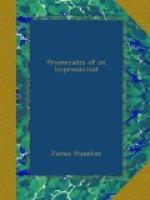Need we say that Degas is a great wit, though not a writer; a wit and a critic? Rousseau, the landscapist, made notes, and Corot is often quoted. If Millet had never written another sentence but “There is no isolated truth,” he would still have been a critic. Constable with his “A good thing is never done twice”; and Alfred Stevens’s definition of art, “Nature seen through the prism of an emotion,” forestalled Zola’s pompous pronouncement in The Experimental Novel. To jump over the stile to literature, Wordsworth wrote critical prefaces, and Shelley, too; Poe was a critic; and what of Coleridge, who called painting “a middle quality between a thought and a thing—the union of that which is nature with that which is exclusively human”? There are plenty of examples on the side of the angels. Whistler! What a critic, wielding a finely chased rapier! Thomas Couture wrote and discoursed much of his art. Sick man as he was, I heard him talk of art at his country home, Villiers-le-Bel, on the Northern Railway, near Paris. This was in 1878. William M. Hunt’s talks on art were fruitful. So are John Lafarge’s. The discreet Gigoux of Balzac notoriety has an entertaining book to his credit; while Rodin is often coaxed into utterances about his and other men’s work. There are many French, English, and American artists who write and paint with equal facility. In New York, Kenyon Cox is an instance. But the chiefest among all the painters alive and dead, one who shines and will continue to shine when his canvases are faded—and they are fading—is Eugene Fromentin, whose Maitres d’autrefois is a classic of criticism. Since his day two critics, who are also painters, have essayed both crafts, George Clausen and D.S. MacColl.
Professor Clausen is a temperate critic, MacColl a brilliant, revolutionary one. The critical temper in either man is not dogmatic. Seurat, the French Neo-Impressionist, has defended his theories; indeed, the number of talented Frenchmen who paint well and write with style as well as substance is amazing. Rossetti would no longer be a rare bird in these days of piping painters, musicians who are poets, and sculptors who are painters. The unfortunate critic occasionally writes a play or an opera (particularly in Paris), but as a rule he is content to echo that old German who desperately exclaimed: “Even if I am nothing else, I am at least a contemporary.”




